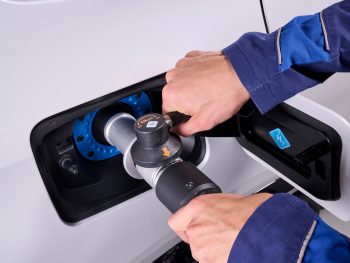New report sets out three key tasks for hydrogen transport rollout
A new report containing three key recommendations to ensure the successful implementation of hydrogen within the UK transport sector is now out.

The report calls for a coordinated, national hydrogen transport strategy to support the UK’s decarbonisation and path to net zero
Published by the Hydrogen UK (HUK) trade association, the report calls for a coordinated, national hydrogen transport strategy to support the UK’s decarbonisation and path to net zero.
The white paper says there are three key areas that must be tackled to ensure the successful implementation of hydrogen within the UK transport sector:
- Publish a Hydrogen in Transport strategy cutting across all modes of transport enabling synergies to be identified and built upon.
- Establish a minimum viable network of 200, >1 tonne per day capacity, hydrogen refuelling stations by 2030.
- Ensure the rollout of more hydrogen ecosystems like the Tees Valley project which attempt to aggregate various hydrogen demands to de-risk supply investment.
The report benchmarks our hydrogen transport deployment and hydrogen-related transport policies against other international economies, and is intended to act as a springboard for further analysis and spark debate with key Government and industry stakeholders.
Hydrogen UK’s CEO Clare Jackson said: “We’re at an exciting juncture in the deployment of hydrogen as an essential component in the UK’s path to Net Zero. We know that hydrogen has a critical role to play in the decarbonisation of transport and this report highlights the importance of implementing a national hydrogen transport strategy. The UK Government and hydrogen industry must respond to ensure that we capitalise on the opportunities presented by this critical resource, which will help to drive the decarbonisation of our transport sector.”
Automotive and energy developer First Hydrogen, which is a member of Hydrogen UK, said the UK urgently needs to develop a national Hydrogen Transport strategy if it wants to deliver the opportunities of job creation and economic growth that the sector offers.
Allan Rushforth, chief commercial officer, added: “Successful deployment requires coordination between transport networks and energy production, together with a combination of H2 refuelling on trunk roads and at zero emission fleet depots. Without this, hydrogen ecosystems such as Tees Valley and urban Ultra Low Emission Zones will not deliver the potential boost to regional and national growth, or indeed net zero target achievement, that can be achieved with greater engagement from Government.”
It’s the third report to come out from Hydrogen UK this year. The previous report, Recommendations for the Acceleration of Hydrogen Networks, was released in January 2023 and can be read here.
The Hydrogen UK Transport Working Group will also explore other topics this year, including:
- Helping shape policy in areas where hydrogen is an emerging and promising transport solution (construction equipment, aviation, maritime and commercial vehicles).
- Identifying synergies in using hydrogen between different transport sectors such as maritime and freight vehicles.
To access the new report on Hydrogen Transport Benchmarking, click here.

